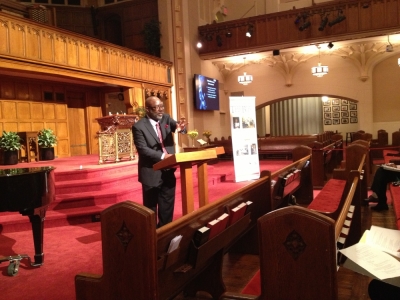'Cost of Seminary Is Out of Control,' Says President of The Urban Ministry Institute

NEW YORK – Pointing to research showing that the average cost of a seminary education ranges from $35,000 - $50,000, the president of The Urban Ministry Institute (TUMI), Don Davis, said the hefty price tag has become one of the main barriers to training more leaders for ministry.
"Frankly, traditional education costs too much. The cost of seminary is out of control, $35,000 - $50,000 is the average," said Davis at the "Educate: Empower" conference of church leaders at Calvary Baptist Church in Manhattan, N.Y., on Thursday.
"People come out of seminary and they can't go to a little congregation where on a good Sunday our offering is $27.20. They have to service a loan. They will not go to a poor church. It's a bad system. We train people and none of them deploy to urban poor neighborhoods. None of them virtually," he added.
Davis, who prefaced his comments with compelling research highlighting that a majority of the world's population is now trending toward urban environments, noted that there was a real need for changing the traditional model of training leaders for ministry in today's world.
"If Christ tarries, in a few years, most of the world will be urban slums, 2/3 of the world will be somebody urban and poor and we're not servicing them, we're not getting ready for them," said Davis, who explained that in order to get ready, the barriers to leadership training in seminaries needed to be eliminated.
He said he had to hold several jobs including one as a full-time pastor to make his way through seminary, but he doesn't believe that it was the most efficient way of empowering Christian leaders to reach the sheer number of people who needed to hear the Gospel.
"The only way to get through seminary is to have wealth or know somebody rich. The working poor need not apply. I say this honestly," quipped Davis.
"Frankly, spirituality is not enough. I tell my students that 'you could raise somebody from the dead and you still won't get into a real graduate school without the money. I'm telling you the truth," said Davis, as the audience erupted in laughter.
Calling the system of access irresponsible, he noted that: "President [Jerry] Campbell at Claremont [School of Theology], he said, 'It's almost unconscionable to graduate students to go into a low-paying environment with large amounts of debt.' So the first barrier, if we're gonna train people, they shouldn't owe anything when they're done."
He noted that seminaries also needed to make their courses more relevant to life in an urban environment, pointing out that traditional seminaries had a suburban bias.
"We train people in the context of city life," said Davis, noting that because of their approach, TUMI was "deliberately unaccredited."
The vast majority of the people in the city, he explained, don't have the background to qualify for traditional training and it was important for seminaries to find creative ways to help create leaders for ministry.
He also criticized the lack of active church membership as a requirement for entry into many traditional seminaries, pointing out that the ability to pay for the degree and academics are being given more weight to access traditional seminaries.
"Men and women have no loyalty to the church when they are fully trained," said Davis. "This is a fatal flaw. It's a backward and bad system."
He also pointed out that there was a need for the programs at seminaries to be more sensitive to ministering in the growing urban environment and making their curricula more relevant.
"The current curriculum is completely esoteric and bloated," said Davis. "It's not 'preachable', which is a good sign of whether something is good," he added.





















